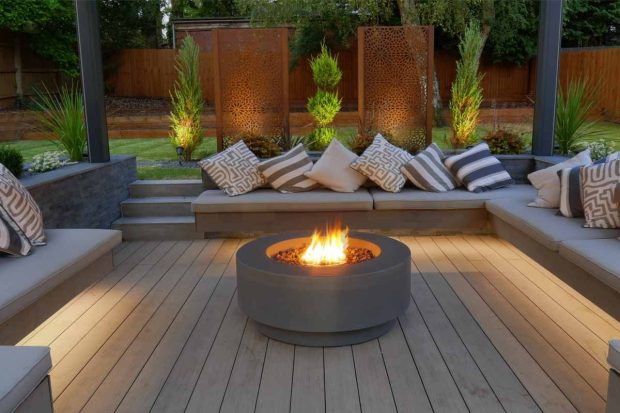The Pros and Cons of Different Decking Materials
The single most important decision in building a deck is choosing what material to use for its construction. This choice will have long-term consequences that will impact its durability, maintenance, and overall aesthetic. Ultimately, factors like your location, upkeep, and budget will influence your preferred deck material most.


So, before you sit down with a custom deck builder to plan your new deck, it’s important to evaluate your material options carefully.
Pros and Cons of Decking Materials
There are several types of materials to consider when designing your new deck:
- Natural wood
- Exotic wood
- Pressure-treated wood
- Composite
- PVC
- Aluminum
Each has its benefits and disadvantages, which impact pricing, maintenance requirements, durability, and overall aesthetics. To get a better idea of these factors, we have provided a brief overview of decking material pros and cons below:
Natural Woods
When choosing a natural wood material to build your deck, opt for redwood and cedar because of their natural beauty and rot resistance. These qualities have made them an industry staple in the deck-building industry.
Pros
- Features the authentic beauty of natural wood
- Staining is optional
- Easy to cut and install
Cons
- Requires occasional washing
- Will have to refinish it throughout its lifetime
- Is somewhat expensive
- Not a sustainable resource
Exotic Hardwoods
If you want an exceptionally durable wood deck, one constructed out of exotic hardwoods like ipe or black walnut provides attractive yet long-lasting results.
Pros
- Like cedar and redwood, hardwoods are rot-resistant and have been known to last decades.
- Other than sealing, hardwoods offer beautiful grains and hues that don’t require staining.
- These woods have a low impact on the environment.
Cons
- Exotic hardwoods are a premium product that carries a high price tag
- Installation is labor intensive and requires additional pre-drilling due to wood density
Pressure-Treated Woods
Pine and spruce are popular wood species that grow in abundance and can be chemically treated to resist pests and rot related to moisture. Just like cedar, you can stain these planks with your preferred hue to customize your deck’s appearance.
Pros
- Pressure-treated wood costs significantly less than natural woods
- Can potentially last decades, depending on use and environmental damage
- Easy to cut and install
Cons
- Treated with toxic chemicals that can leach into the ground if not sealed
- Requires regular cleaning and sealing to maintain its appeal
- Can’t dispose of this wood in a burn pile due to its chemical treatment
Composite Planks
One of the easier decking materials to maintain, composite decking is resistant to rot, splintering, and mold. It’s comprised of resin and wood fibers, increasing its durability and resistance to the elements.
Pros
- Other than occasional washing, no resealing or staining is necessary
- Made of recycled materials
- Offers a wide range of styles and colors
- Can be installed using hidden fasteners
Cons
- Some brands have absorbency issues which could result in swelling and mold development.
- Composite planks can heat up in the sun because of the plastic content
- Costs are typically higher than that of natural wood
- Installation can be challenging due to the heaviness of this material
Plastics
Decking boards manufactured out of plastic have been around for a few decades now and are popular for their mold and rot-resistant qualities. These come in a variety of styles that mimic wood, stone, and other popular materials.
Pros
- Warping, fading, and rotting rarely occur with this material
- Maintenance is minimal since they don’t splinter or fade
- Warranty periods are usually 30 years or more on average
- Pricing is usually more budget-friendly
Cons
- Plastic planks tend to heat up in the summer, making them too hot to walk on barefoot
- It doesn’t have a natural appeal because of its glossy surface
- Typically not constructed from recycled plastic which hurts the environment
Aluminum
If you are okay with creating a natural aesthetic, aluminum decking is a reliable option that has been popular for over 75 years because of its many advantages. Decks using this type of material are typically attached to an entirely metal joist system and secured with hidden fasteners.
Pros
- You can opt to paint aluminum decking or leave its finish as is and enjoy a modern and sleek aesthetic
- Aluminum is lightweight and easy to manage
- Naturally rust resistant
- Won’t overheat on hot sunny days
- Unparalleled durability
Cons
- Is an expensive material
- Slip risk is higher even if the surface gets coated with a slip-resistant chemical
- Just like metal roofs, aluminum decking is noisy and echoes
- Manufacturers don’t always use recycled aluminum materials when producing this decking
Final Thoughts on Choosing Decking Materials
As you read through the pros and cons of your preferred deck material options, it’s easy to see how cost and maintenance quickly take priority in your decision-making process. While natural wood may look amazing, you need to decide if the extra upkeep is worth it. On the other hand, you want to save money on less expensive composite though it’s easier to maintain.
It’s a challenging decision that will have both benefits and drawbacks over time as your deck ages. The most important takeaway from this article is understanding that, like any other part of your home, your new deck will always require some level of care to keep it looking beautiful.